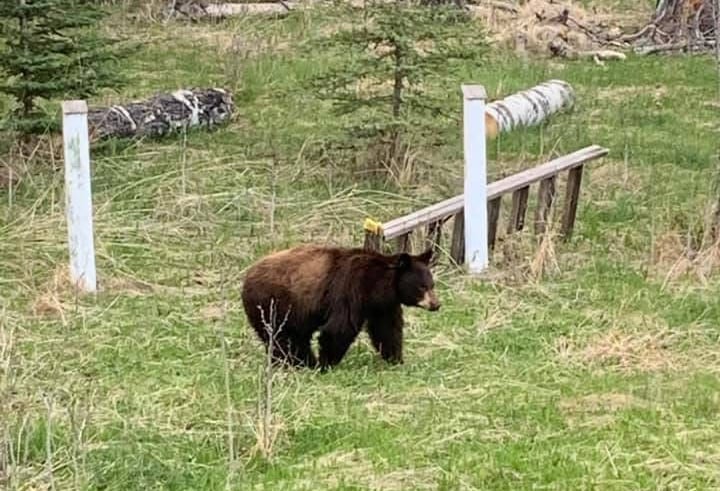As anybody who’s a fan of Banjo-Kazooie or Winnie-the-Pooh knows, bears love honey — but for beekeepers in Mountain View County, that famous sweet tooth is more of a cause for concern than a cute craving.
Simone and Steven Dold operate S2Apiary in the central Alberta community of Bearberry, located approximately 107 kilometres northwest of Calgary in the foothills of the Rocky Mountains.
Since the couple took up beekeeping in 2017, they’ve found out firsthand that bears just can’t keep themselves away from their hives.
The apiary’s latest bear visit was caught on camera earlier this month, when a grizzly paid their property a late-night visit on Oct. 2.
“In this case he kind of knocked around a few saw horses that we had just outside our bee yard, and he did a couple laps around the bee yard, but never really figured out a way to get through the electric fence,” Steven said.
Mountain View County beekeepers Simone and Steven Dold often have to deal with unwanted guests trying to steal from their hives, like this grizzly bear. The brazen bruin attempted to pull off a late-night heist — but didn’t get the honey it was looking for.
Steven called being visited by bears “one of the realities, and nature, of being in this part of the country.”
Living in bear country means all residents have to take special precautions — especially those with bear magnets like beehives on their property.
“During the spring, summer, and fall, we use properly-installed electric fencing around our bee yards, which has proven to be the most effective deterrent against bears,” Simone said.
“We also make sure not to feed birds, leave out compost, or expose any bee equipment or feed that could attract them.”
Steven said whenever their hives have been broken into by bears, they play it safe by removing that entire bee yard, “just so that it doesn’t come back and visit that that same location, because … if they do find a food source or a meal, they’ll return.”
Being bear-aware and vigilant has kept S2Apiary from suffering any significant losses at the paws of bears.
“Once they they come into contact with an electric fence, they learn,” Steven said.

With their beekeeping business only one of countless agriculture operations in grizzly bear territory, the apiarists stressed the importance of being bear-aware under all circumstances in rural Alberta.
“Beekeepers can lose entire apiaries, and farmers can lose calves, lambs, and poultry to bears. We have many families with young children in the area and they also need to remain vigilant outdoors, especially at dawn and dusk,” Simone said.
She said the two are sure to let would-be visitors know ahead of time about recent bear sightings on the property, in case that changes their mind about coming over.
Grizzly bear range expanding across Alberta, minister says
Bearberry is a place where grizzlies are expected to be, but Alberta Minister of Forestry and Parks Todd Loewen told CBC News the threatened species has been “spreading into areas where it hasn’t been before” — including in the easternmost parts of Mountain View County, and further east in central Alberta than they had been for many years.
“We’re definitely seeing an increased distribution of grizzly bears across the province, and an increased density too,” Loewen said.
He attributed that increased distribution to the province’s recovery plan, which includes monitoring grizzly populations, working to minimize the risk of human-wildlife conflict and human-caused grizzly bear mortality, and raising awareness on proper co-existence with bears.
“I think it’s plain to see that the recovery plan is working, and grizzly bear population is rising,” Loewen said.
“But at the same time, we’re concerned about the negative grizzly-human interaction that’s been happening.”
Loewen pointed to the Alberta BearSmart Program, through which the province works with municipalities and residents to provide education and information on co-existing with bears.
Mountain View BearSmart is among the organizations involved in that network. The organization tracks sightings of bears and other large carnivores in Mountain View County and neighbouring Clearwater County, while offering resources and hosting events to promote peaceful wildlife co-existence.






